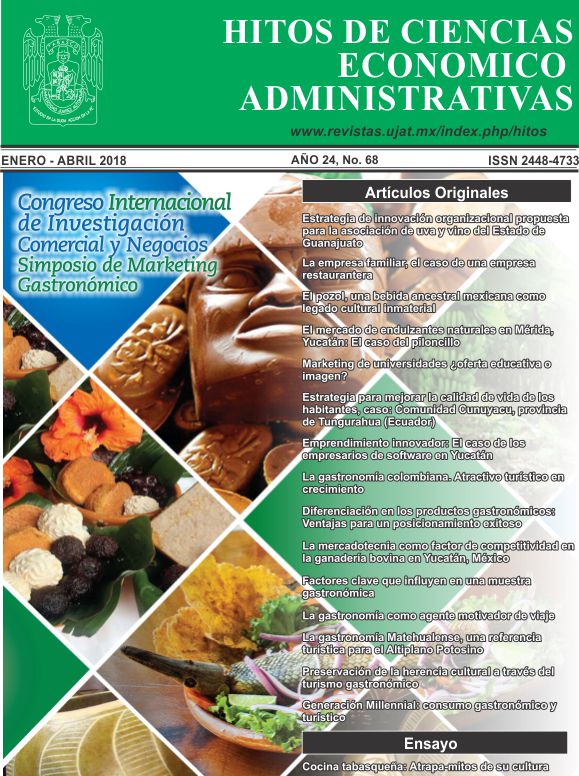LA EMPRESA FAMILIAR, EL CASO DE UNA EMPRESA RESTAURANTERA
DOI:
https://doi.org/10.19136/hitos.a24n68.2487Keywords:
Gerencia familiar. PyMEs. Proceso administrativo. Relación empresa-familia.Abstract
OBJETIVO: Identificar las creencias potencializadoras y limitantes que se tienen sobre la administración de un negocio familiar desde la mirada del dueño(a) para reflexionar sobre aquellas oportunidades o dificultades en los procesos administrativos que pudieran no ser conscientes en pro del crecimiento de la propia empresa. MATERIAL Y MÉTODO: La investigación es un estudio de caso con investigación de campo, es de corte cualitativo, por medio de entrevista a profundidad, el instrumento empleado es el cuestionario de (Aguilar, Sandoval, Surdez, & Gómez, 2013). RESULTADOS: Se encontró que el dueño de la empresa tiene procedimientos administrativos escasos, su estructura administrativa es muy sencilla, no tiene un organigrama donde se pueda ver el nivel de jerarquía que manejan, hasta ahora no quiere nombrar a un sucesor. Se propone que la empresa cuente con una planeación estratégica, que le permita diferenciarse de la competencia, y así sirviéndole a su vez de ventaja competitiva, así como de soporte para su continuidad, se recomienda formalizar la estructura y funciones de la empresa, que permita una transición exitosa. CONCLUSIONES: Con base a la información recabada se puede concluir que la empresa familiar carece de una formación empresarial, la cual le impide tener una concepción de las funciones administrativas que garantizan un funcionamiento eficiente del negocio; Sin embargo ha podido ocupar un lugar importante en el mercado regional y gracias a eso han podido ir creciendo, no cuenta con un registro de marca; la estructura de la empresa esta desequilibrada ya que no existe tal estructura y cada miembro de la familia no tiene un lugar específico de desempeño.Downloads
Downloads
Published
Issue
Section
License
As a requirement for the manuscript, the author is requested to provide the Copyright Assignment Letter, so that the Journal has the publication rights and to avoid plagiarism.
PLAGIARISM POLICIES
The Editorial Board of the Journal HITOS DE CIENCIAS ECONÓMICO ADMINISTRAIVAS has the authority to reject in the review process any manuscript that does not have adequate citation in the documents consulted in its scientific research work, which can be considered as plagiarism behaviors. Likewise, the referees carry out the plagiarism review using specialized software, such as iThenticate, among others.
COPYRIGHT POLICIES
Authors who have publications in the journal accept the following terms: • At the time the manuscript is accepted, the author transfers the copyright to the Journal HITOS DE CIENCIAS ECONÓMICO ADMINISTRATIVAS.
- The authors may make additional agreements for non-exclusive distribution of the published version of the article (e.g., including it in an institutional repository or publishing it in a book) provided that the initial publication in this journal is indicated.
- Authors are allowed and recommended to publish their research work on the Internet (eg, institutional or personal files), which would allow more beneficial exchanges to increase the citation of the published work.
This work is licensed under Creative Commons Attribution-NonCommercial-NoDerivatives 4.0 International





